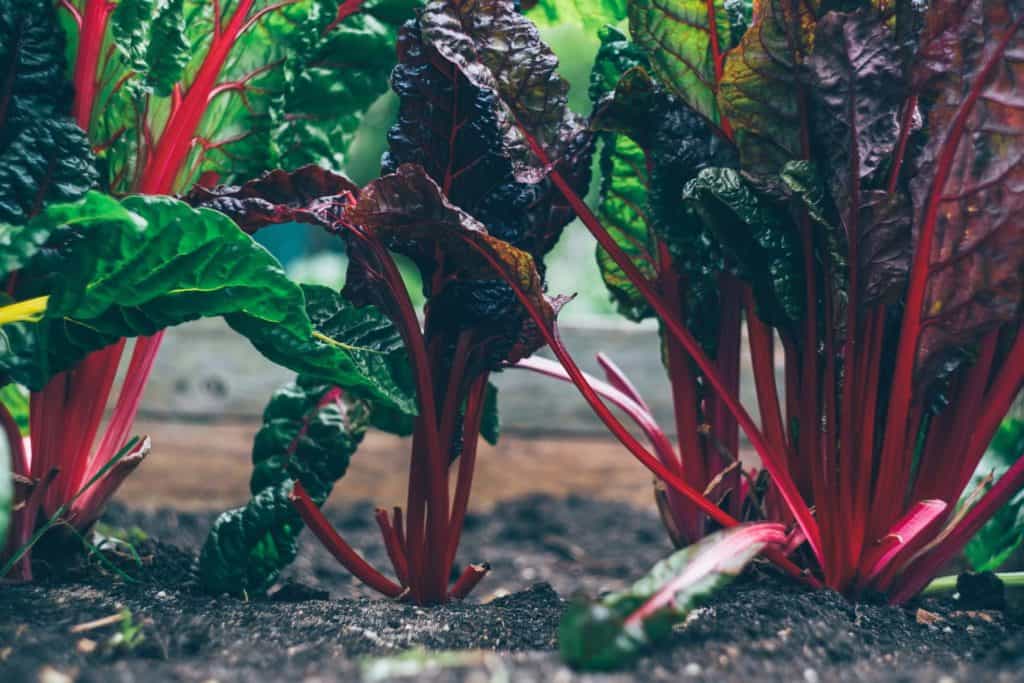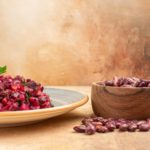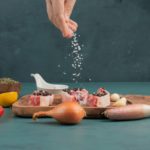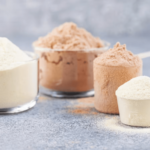
Carly Hanna
BSc (Human Nutrition and Psychology)
Note — The article was checked and updated November 2023.
The term plant-based diet has been thrown around quite a lot recently – especially so amongst health, environmental/sustainability, and animal welfare debates.
A plant-based diet is not exclusively vegetarian or vegan. The main food sources come from plants, but it can also include small amounts of meat, dairy, honey and eggs.
In saying that, what exactly does a plant-based diet entail?
Definition of a plant-based diet
A plant-based diet focuses on eating mainly foods that come from plants, with the small addition of animal products such as lean meat, low-fat dairy, and eggs. The basis of a plant-based diet includes mostly vegetables, fruit, wholegrains, beans and legumes, and healthy fats such as nuts, seeds, and some oils.[1]
RELATED — Anti-cancer foods: The Healthiest Nuts (Part 1)
Originally, “plant-based” was another label to a vegan diet and has seemed to evolve from vegan to vegetarian to a more flexitarian diet. In recent times, a plant-based diet is thought to be similar to a Mediterranean diet, which has soundly been proven to be most beneficial to our health.
With an increase in demand for plant-based products and knowledge on the health benefits, we might wonder what products are actually “plant-based”.
Plant-based diet is thought to be similar to a Mediterranean diet
While the term “plant-based” can be used interchangeably with vegetarian and/or vegan, certain products labelled plant-based can still contain animal products.
RELATED — Plant-based products: what are they really made of?
If we have specific dietary requirements eg. allergies or follow a vegetarian/vegan due to ethical reasons, then it always pays to check products that are labelled plant-based.
What is a Vegan Diet?
A vegan diet is a diet made up of solely plant foods and excludes all animal products such as meat, fish, poultry, dairy products, eggs, and other animal-derived substances.[2]
RELATED — The Vegan Diet and Lifestyle: Benefits, Risks and Meal Plans
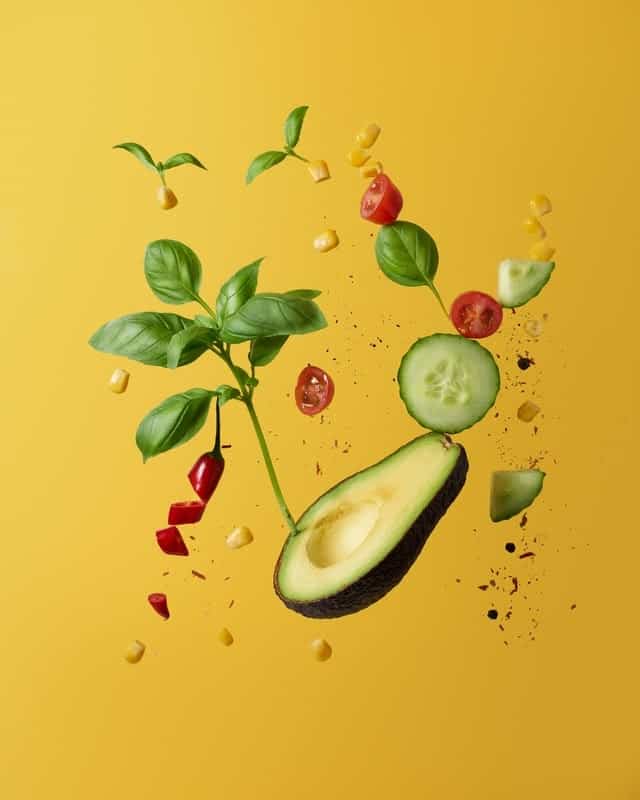
Compared to a plant-based diet, a vegan diet is more commonly adopted due to ethical, environmental, and/or health reasons.
People may consider animal welfare, sustainability, and reducing risks of diet-related disease such as cardiovascular disease and obesity, which we will explain in more detail. If you are interested reading more about food and sustainability see
RELATED — What is Seaweed and can it be our future food source
While some may follow a vegan diet, for others it can be more of a lifestyle where they avoid animal products all together. This can involve not having leather, wool, or fur clothing.
Although it is more restrictive than a vegetarian or plant-based diet, a vegan diet can still have a high mediterranean diet score. Vegan diets can be well planned to get the key nutrients we need as we shared in the table further down in the article.
What is a Vegetarian Diet?
A vegetarian diet typically excludes animal meat and seafood.[2] This can also include other animal byproducts such as gelatin (commonly found in lollies and jellies) and rennet (found in some cheeses).
Certain animal byproducts may be avoided due to religious or cultural beliefs. Compared to a vegan diet, vegetarians can include dairy and eggs – depending on the type of vegetarian. Some variations of a vegetarian diet are included in the list below.[2,3]
RELATED — Everything You Need to Know When Buying Eggs (Part 1)
Pescetarians typically don’t eat meat (eg. beef, chicken, pork) but include fish in their diet. The remaining bulk of their diet comes from wholegrains, vegetables, fruits, nuts/seeds, dairy and eggs.
Lacto-ovo vegetarian
Lacto-ovo vegetarians typically don’t eat meat or fish, but eat animal byproducts such as dairy (lacto) and eggs (ovo). This is what is most commonly referred to as vegetarian.
Ovo-vegetarian
Ovo-vegetarians typically don’t eat meat, fish or dairy, but include eggs in their diet. This can be due to sustainability, animal ethics or personal preference as well as dairy intolerance or allergies.
Lacto-vegetarian
Lacto-vegetarians typically don’t eat meat, fish or eggs, but include dairy in their diet. The exclusion of eggs may come down to ethical issues around egg production, in particular caged-eggs.
Vegan
Vegans typically exclude all animal products including meat, dairy, eggs, and animal-derived products such as honey and gelatin. This can either be a diet or lifestyle (i.e. extend to more than just food but other animal products such as leather, wool etc).
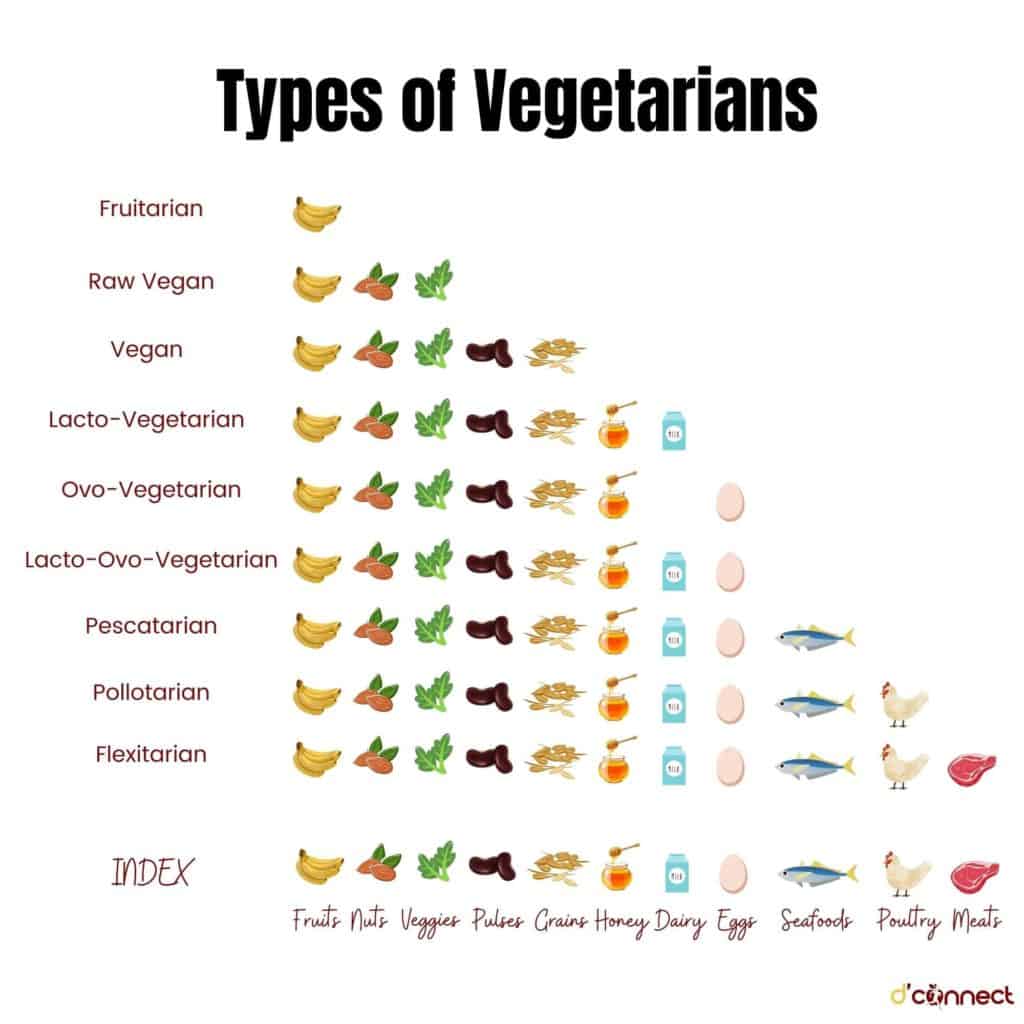
Flexitarian
Flexitarians eat mainly plant-based foods but include animal products such as meat, dairy and eggs occasionally – what we are referring to as a plant-based diet.
Major food sources for Vegans and Vegetarians
There are three key macronutrients that the body needs. These are protein, carbohydrate, and fat. Our bodies also need micronutrients (vitamins and minerals).
Example food sources of these can be found in the table below, however, it might be useful to go through the foods that distinguish between a vegetarian and vegan diet.
For vegetarians, pescetarians, and flexitarians, dairy can be a great source of calcium, protein, fat and natural sugars such as lactose. Vegetarians can get lots of these nutrients from dairy products, such as milk, cheese and yoghurt.
Vegans, however, avoid dairy products. So how can they get these same nutrients? While most non-dairy milk alternatives can be fortified with essential nutrients such as calcium, B12, and vitamin D, it is important to consider the nutritional compositions between them.
Soy milk has the closest composition to dairy milk and contains the highest amount of protein and healthy fats compared to other dairy free alternatives.
Oat and rice milk are the most sustainable types of milk for those concerned for environmental reasons. They are higher in carbohydrates and lower in protein and fat.
Almond milk and coconut milk are generally high in fat and have minimal protein and carbohydrates.
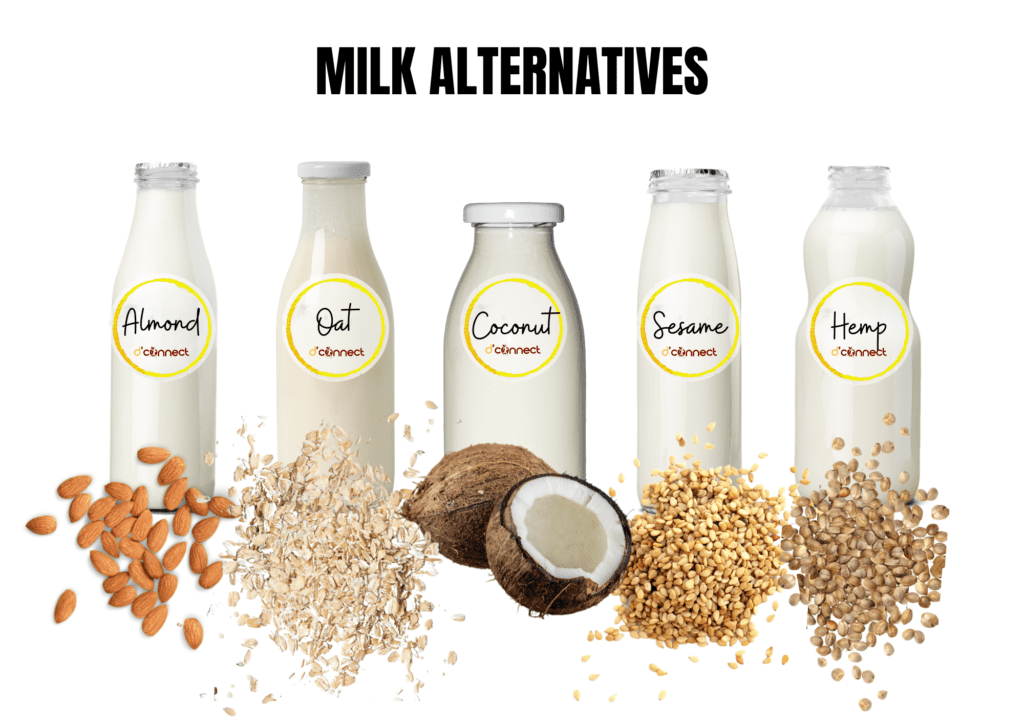
Dairy-free cheeses can sometimes be made from coconut oil and/or soy products, so they won’t have the same nutrition as dairy cheese (ie. protein and calcium); not all dairy-free cheeses are fortified with calcium. For a vitamin and mineral boost, nutritional yeast is a vegan flavouring that can be added to dishes for a cheesy flavour.
Not all dairy-free cheeses are fortified with calcium
Eggs are a great nutrition source for vegetarians, pescetarians, and flexitarians. While the yolk of the egg tends to have high cholesterol, the egg whites are high in protein without the added fat. Different egg substitutes for those who are vegan can include:
- aquafaba (chickpea brine) for egg white replacement in recipes such as meringue
- flaxseeds and chia seeds (binding agent in cooking/baking)
- oil and applesauce (binding agent in cooking/baking)
- store bought egg replacer
- tofu can also be scrambled or made into an omelette quiche.
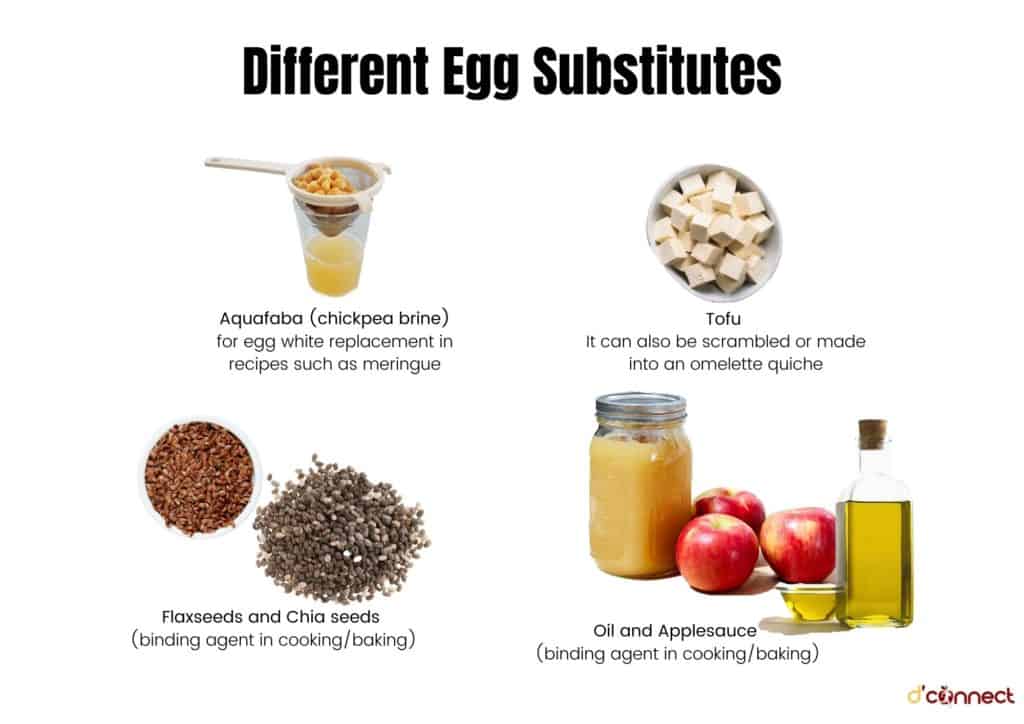
Protein | Carbohydrate | Fat | Vitamins + Minerals* | |
Vegan, Vegetarian, Pescetarian, Flexetarian/Plant-Based | ||||
Beans/legumes | High | High | Low | Iron, folate, potassium |
Soy products – tofu, tempeh, isolated protein, edamame beans | High | Medium | Medium | Calcium, omega 6’s |
Wholemeal bread + pasta | Medium | High | Low | Iron, folate, zinc, magnesium |
Wholegrains such as quinoa, brown rice | Medium | High | Low | Iron, zinc, magnesium, |
Starchy vegetables such as potato and kumara | Low | High | Low | Magnesium, potassium, B vitamins |
Non-starchy vegetables | Low | High | Low | Varying micronutrients |
Fruits | Low | High | Low | Varying micronutrients |
Nuts and seeds | High | Low | High | Omega 3’s and 6’s, zinc, magnesium |
Avocados | Low | Low | High | Vitamin E |
Oils | Low | Low | High | Omega 3’s and/or 6’s (depending on oil type) |
Soy milk | High | Medium | Medium | Calcium, B12, vitamin D |
Rice and oat milk | Low | High | Medium | Calcium, B12, vitamin D |
Almond and coconut milk | Low | Medium | High | Calcium, B12, vitamin D |
Nutritional yeast and marmite | High | Low | Low | B vitamins |
Vegetarian, Pescetarian, Flexetarian/Plant-Based | ||||
Eggs | High | Low | High | Iron, folate, zinc, choline |
Dairy products eg. milk, cheese, yoghurt | High | High | High | Calcium, vitamin D |
Low-fat dairy products | High | High | Low | Calcium, vitamin D |
Pescetarian, Flexetarian/Plant-Based | ||||
Fish and seafood | High | Low | High | Omega 3’s, zinc, iron, iodine |
Flexetarian/Plant-Based | ||||
Red meat | High | Low | Low-High | Iron, B vitamins |
Poultry | High | Low | Low-High | Iron, B vitamins |
RELATED — Magnesium: For a great night of sleep
Notes: *There is a wide range of nutrients found in all of these foods (ie. some may not be listed). Vitamin and mineral content can also vary across different products and brands.
Proven health benefits of plant-based diet
New Zealand food guidelines are leaning towards a more plant-based approach both for health and sustainability reasons.[4] As outlined previously, the bulk of a plant-based diet includes vegetables, fruit, wholegrains, beans and legumes, nuts/seeds, and the addition of lean meat, low-fat dairy and eggs.
Lower risk of stroke
Those who consume little to no meat have a lower risk of stroke. This can be due to having a lower blood pressure compared to the standard western diet.[5]
Healthy weight
Evidence shows that there are lower rates of obesity in vegetarians compared to non-vegetarians.[5] Having a healthy BMI (measure of weight and height) reduces the risk of any diet-related disease.
Healthy cardiovascular system
Preventing hypertension
Reducing consumption of bad fats
Reducing our saturated fat intake with a plant-based diet can lead to having a better fat intake profile (lower cholesterol, low saturated and total fat intake, and a higher polyunsaturated fat intake). Polyunsaturated fats are the healthy fats found in foods such as avocados, olive oil, nuts and seeds.[7]
Supporting gut health and digestion
As a plant-based diet focuses on eating mainly fruits, vegetables and wholegrains, this will lead to an increased fibre intake.[1] This will help foster a healthy gut as well as regular bowel movements.
Lowering the risk of diabetes
A wholefoods plant-based diet can help prevent diabetes as it can lower HbA1c levels (biomarker for glucose in the blood).[1,8]
RELATED — Diabetes: Early Signs, Causes, Types and Treatment
Improving performance and recovery
Lowering the risk of mortality
Plant-based diets have a reduced mortality risk compared to other diets.[1] While the amount of extended years of life vary between studies, some show that a plant-based diet can reduce annual mortality risk by 23%.[9]
Potential dangers to plant-based diets
With any diet and lifestyle, not just plant-based ones, there are always potential dangers to missing out on some key nutrients and other diet-related conditions. Things to consider when making informed choices about plant-based diets are as follows:
Protein
We are not at risk for protein deficiency on a plant-based diet as long as we eat enough food [energy] required for our body.[1]
RELATED — Diet and the Brain: Proteins (cognition and brain performance)
Iron
If we’re decreasing our meat consumption, how do we make sure that we have enough iron in our diet? Animal products contain heme iron, which is more absorbable than plant-based sources of non-haem iron.[10]
Plant-based iron sources include: beans/legumes, spinach, certain wholegrains such as oats, cashews and combining these with vitamin C rich foods (such as tomatoes, broccoli, oranges etc) can increase the absorption.
Vitamin B12
Vitamin B12 is produced by bacteria, not plants or animals.[1] While it is found in high quantities in animal products, plant-based sources include fortified non-dairy milk, yeast products, including marmite and nutritional yeast.
Vegans are more likely to have a lower B12 intake so it’s important to eat fortified foods or take a supplement.[5,7]
Omega-3
Omega-3 is an essential fatty acid that is needed for skin, hair and nail health. Omega-3’s are commonly found in seafood so if you’re plant-based, vegetarian, or pescetarian this is the richest source.
Vegetarians and vegans are most likely to be low in omega 3’s, however, plant-based sources include flaxseeds and walnuts.[3]
Zinc
Commonly found in meat and seafood such as oysters, crab, beef and pork, zinc is an essential nutrient. Plant based-sources include some legumes, such as chickpeas, and nuts/seeds, such as cashews.[11]
Calcium
As mentioned previously, calcium is not just found in dairy products. Non-dairy milks can have the same amount of calcium per 100ml as cows milk. Other plant-based sources of calcium include soy products (tofu and tempeh), sesame seeds (including tahini), and dark green leafy vegetables.
Iodine
Vitamin D
As an essential nutrient, vitamin D can come from both sunlight and certain foods. It also helps with the absorption of calcium in the body. Vegans are more likely to have a lower vitamin D intake.[5,7]
RELATED — Vitamin D: The sunshine hormone for stronger bones
It is recommended to take a vitamin D supplement when sun exposure is limited. Also, some non-dairy milks are fortified with vitamin D.
Hormone disruptors
There is a common myth that increased soy consumption can disrupt hormones and lead to increased risk of diseases such as breast cancer. However, while these concerns are valid, there is little scientific evidence behind these claims and the results are hence inconclusive.[5]
RELATED — How common is Breast Cancer and what are the Risk Factors?
Depression and anxiety
Our mental health is equally important to our physical health. Depression is not necessarily caused by a nutrient deficiency, however, food can definitely affect our mood.
RELATED — Introduction to: Depression
High cholesterol
Having high cholesterol can come from having too much saturated fats (commonly found in animal products) in our diet. This can increase our risk of heart diseases. A plant-based approach can help lower our cholesterol levels.
Leaky gut
Antinutrients are compounds found in plants (eg. tannins and phytates) that can reduce the body’s ability to absorb certain nutrients. These are a concern if we are only eating legumes and grains, not the variety that a plant-based diet includes.
However, fermenting, soaking and sprouting our plant-based food can help reduce the antinutrients.[14]
Lower levels of BCAA / EAA
Branched Chain Amino Acids and Essential Amino Acids found in protein help build muscle, aid to sports recovery and overall health.
RELATED — What are Amino Acids and what is their role in keeping us healthy?
There is a concern for athletes that a plant-based diet may inhibit performance, however, research shows that a high protein plant-based diet can be as good as high protein animal-based diet.[15]
For a full article on potential risks of vegan and vegetarian diet see Health Risks of Long-term Vegan and Vegetarian Diet (Part 1).
Junk Food plant-based diet
While certain products can be considered plant-based, eating wholefoods (those with minimal to low processing) is best. This includes vegetables, fruit, wholegrains, beans and legumes, and nuts/seeds.
Processed foods are foods that aren’t in their natural state. This includes foods that are packaged which can have added ingredients to preserve them such as artificial colours and flavourings, salt and/or sugar. White flour, pasta, rice is more refined than wholemeal flour, pasta, and rice.
While plant-based meat alternatives can be a good protein option to lower our meat intake, these are often more processed than our whole food proteins, such as beans, legumes, nuts and seeds.
Processed foods are also more likely to contain saturated fats, which are associated with several diet-related diseases.[1]
Plant-based meat alternatives are often more processed than whole food proteins
As seen in the table above, whole foods can be included in a vegan, vegetarian, pescetarian and a flexitarian (plant-based) diet. The addition of small amounts of meat, seafood, low-fat dairy, and eggs can also provide extra nutrients.
In saying that, what does this look like on a day-to-day basis?
How to do "plant-based diet" the correct way
Vegetables – make sure at least ½ of your plate for lunch and dinner includes vegetables. Smoothies are a great way to sneak vegetables (and fruit) into your breakfast and start the day off right!
RELATED — The Healthy Plate Model: Essential of Healthy Eating
Fruits – 1 to 2 servings of whole fruit a day (lower sugar options include berries). Fruit can be a great snack (especially when paired with protein/fat such as nuts/seeds) or an addition to breakfast and dessert.
Dried fruit is more concentrated than whole fruit and canned fruit can have added sugar in the juice/syrup.
RELATED — Diet and the Brain: Our brain on sugar
While fruit juice can be a source of vitamin C, it is always best to eat the whole fruit because you get the added benefits of fibre and extra nutrients.
RELATED — Vitamin C: Immunity and Collagen booster
Whole grains – make sure ¼ of your plate for lunch and dinner includes wholegrains such as rice, pasta, and bread (wholemeal provides more fibre than white). Other grains that are fun to experiment with include oats, quinoa, barley, millet, and bulgur wheat.
Beans and legumes – lentils, chickpeas, black beans, kidney beans, peas are rich plant-based protein sources that can also add iron and fibre into your diet.
Good fats – nuts, seeds and nut/seed butter, avocados, olives, polyunsaturated and monounsaturated oils such as olive oil. These can be made into healthy salad dressings and sauces to accompany the rest of your meal. Nuts and seeds, such as cashews, almonds, peanuts, sesame seeds can add a nice garnish for a bit of extra crunch!
RELATED — Diet and the Brain: Fats
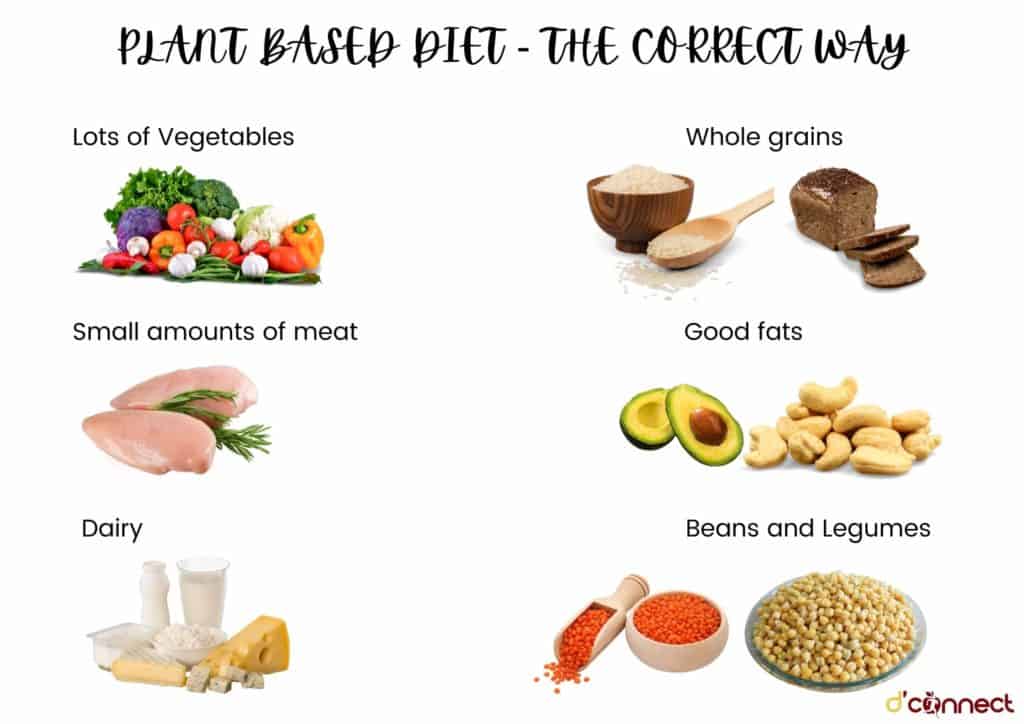
Small amounts of meat – those with low saturated fats are best eg. fish, lean cuts of meat (if vegetarian/vegan have more plant-based proteins such as nuts, beans and legumes).
Dairy – have dairy or dairy-free alternatives (eg. fortified soy milk), as well as the addition of eggs a couple times a week (unless you are vegan). Having eggs can be a great way of getting in the protein.
No processed foods – wholefoods is always best.
Related Questions
1. Are processed foods considered plant-based?
Some processed foods can be considered plant-based if they are just made from plants eg. potato chips.
Whole foods are considered the healthiest choice as they provide the most nutrients.
2. Can eggs be a part of a plant-based diet?
The focus of a plant-based diet is to eat a wide range of plant-based foods and for these to be the bulk of our meals.
Unless you are vegan, the addition of animal-based products, such as eggs, can be part of a plant-based diet and also of benefit to your health.
Let us know in the comments below if we covered everything in this post. Also, visit our Recipe page for great ideas on vegan and vegetarian meals and snacks.
Having passion for mental health and nutrition, Carly’s goal is to become a registered psychologist with a focus on self-care – food, exercise, and sleep. She has a special interest in various mental health disorders, plant-based diets, and the relationship between food and mood.
Through evidence-based research, holistic approach to health and personal experience, Carly hopes to empower others’ well-being.
Carly is a part of the Content Team that brings you the latest news here at D’Connect.
References
(1) Harvard Health Blog. What is a Plant-Based Diet and Why Should You Try It?. 2020. https://www.health.harvard.edu/blog/what-is-a-plant-based-diet-and-why-should-you-try-it-2018092614760
(2) Tuso P, Stoll SR, Li WW. A plant-based diet, atherogenesis, and coronary artery disease prevention. The Permanente Journal. 2015;19(1):62. https://www.ncbi.nlm.nih.gov/pmc/articles/PMC4315380/
(3) Mósesson IE. Nutritional impact on athletic sports performance: the difference between animal-based and plant-based diets (Doctoral dissertation). https://skemman.is/bitstream/1946/37654/6/BS%20-%20ritger%C3%B0.pdf
(4) Ministry of Health. Eating and Activity Guidelines for New Zealand Adults. 2020 https://www.health.govt.nz/system/files/documents/publications/eating-activity-guidelines-new-zealand-adults-updated-2020-jul21.pdf
(5) Key TJ, Appleby PN, Rosell MS. Health effects of vegetarian and vegan diets. Proceedings of the Nutrition Society. 2006 Feb;65(1):35-41. https://www.cambridge.org/core/journals/proceedings-of-the-nutrition-society/article/health-effects-of-vegetarian-and-vegan-diets/1B1F779BC279BE2F632C48F5BDB4DF64
(6) Cade JE, Burley VJ, Greenwood DC, UK Women’s Cohort Study Steering Group. The UK Women’s Cohort Study: comparison of vegetarians, fish-eaters and meat-eaters. Public health nutrition. 2004 Oct;7(7):871-8. https://www.cambridge.org/core/journals/public-health-nutrition/article/uk-womens-cohort-study-comparison-of-vegetarians-fisheaters-and-meateaters/F989DCB37A62646795198506D7DF3EF3
(7) Clarys P, Deliens T, Huybrechts I, Deriemaeker P, Vanaelst B, De Keyzer W, Hebbelinck M, Mullie P. Comparison of nutritional quality of the vegan, vegetarian, semi-vegetarian, pesco-vegetarian and omnivorous diet. Nutrients. 2014 Mar;6(3):1318-32. https://www.mdpi.com/2072-6643/6/3/1318
(8) Williams KA, Patel H. Healthy plant-based diet: what does it really mean?. 2017; 423-425 https://www.jacc.org/doi/full/10.1016/j.jacc.2017.06.006
(9) Sinclair DA. Plant-Based Diets and Longevity. Alternative and Complementary Therapies. 2020 Aug 1;26(4):153-4. https://www.sciencedirect.com/science/article/pii/S037851220900259X?casa_token=RKU6L_RFBEIAAAAA:PkWXv4HTXxVCCkFf50i2jCKb2Nv8ksnza_F9WXvPQQ-j17qdiRoEoQtC_-eSGG-dsZh-V56lLw
(10) Anderson GJ, Frazer DM, McKie AT, Vulpe CD, Smith A. Mechanisms of haem and non-haem iron absorption: lessons from inherited disorders of iron metabolism. Biometals. 2005 Aug 1;18(4):339-48. https://link.springer.com/content/pdf/10.1007/s10534-005-3708-8.pdf
(11) Murphy EW, Willis BW, Watt BK. Provisional tables on the zinc content of foods. Journal of the American Dietetic Association. 1975 Apr 1;66(4):345-55. https://europepmc.org/article/med/1090644
(12) Haldimann M, Alt A, Blanc A, Blondeau K. Iodine content of food groups. Journal of Food Composition and Analysis. 2005 Sep 1;18(6):461-71. https://www.sciencedirect.com/science/article/pii/S0889157504001085?casa_token=aZiUUGovpFMAAAAA:EFq0RSr6UDb4lIAskevcX0QStsAIRbhjrpQDT2naTiYQED-ZsRRh07eydSo2o9leiLGSgo6CDw
(13) Null G, Pennesi L. Diet and lifestyle intervention on chronic moderate to severe depression and anxiety and other chronic conditions. Complementary therapies in clinical practice. 2017 Nov 1;29:189-93. https://www.sciencedirect.com/science/article/pii/S1744388117302694?casa_token=LiTSLlFeKYwAAAAA:44yh9c8ZaP5_wINYaImwbTZI1jmQ3EMNjp_mj_aA2AfruMo_GAWVrYqmBu1WRLO3MFFzTnpXWw
(14) Healthline. How to Reduce Antinutrients in Food. 2017. https://www.healthline.com/nutrition/how-to-reduce-antinutrients#TOC_TITLE_HDR_5
(15) Hevia-Larraín V, Gualano B, Longobardi I, Gil S, Fernandes AL, Costa LA, Pereira RM, Artioli GG, Phillips SM, Roschel H. High-protein plant-based diet versus a protein-matched omnivorous diet to support resistance training adaptations: a comparison between habitual vegans and omnivores. Sports Medicine. 2021 Jun;51(6):1317-30. https://link.springer.com/article/10.1007/s40279-021-01434-9?fbclid=IwAR0aEMqJiFZhRYNHER2YUSEi-vlKxfZWijwGzNuxOcfuGCDzbICuqzDwq6g

